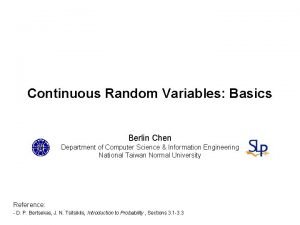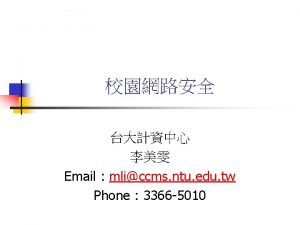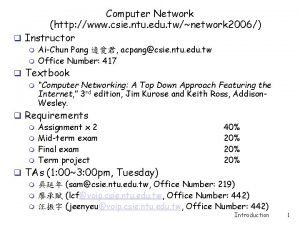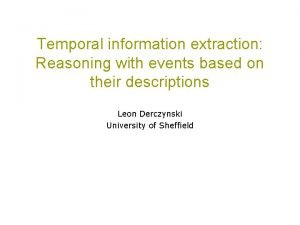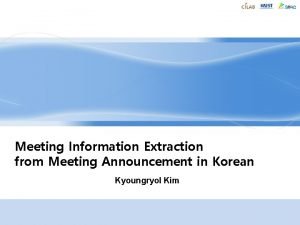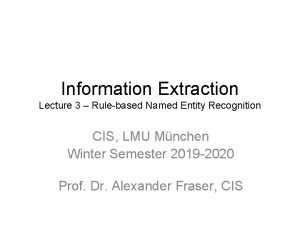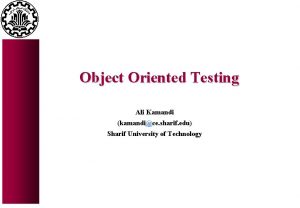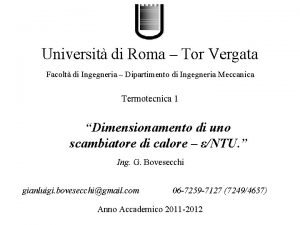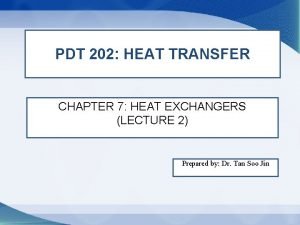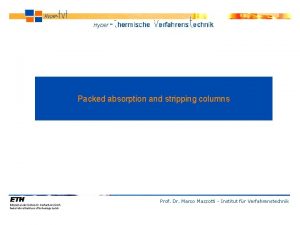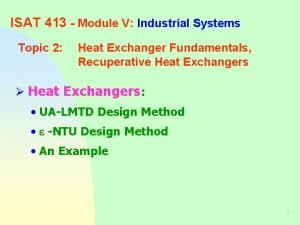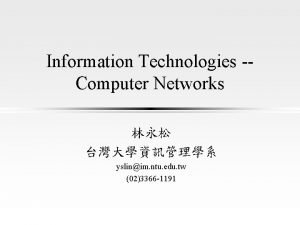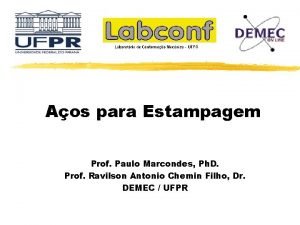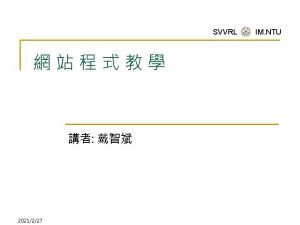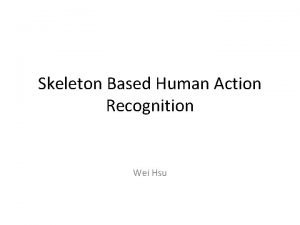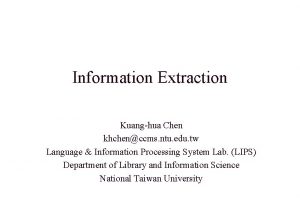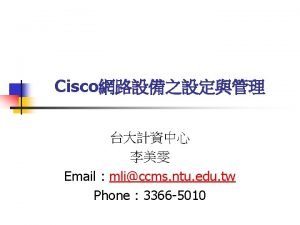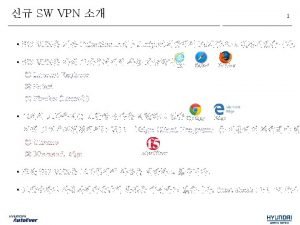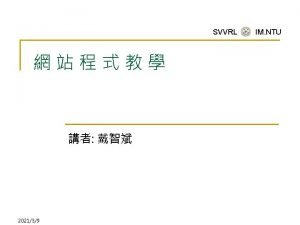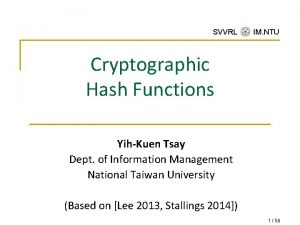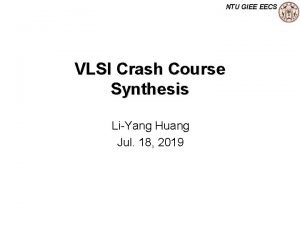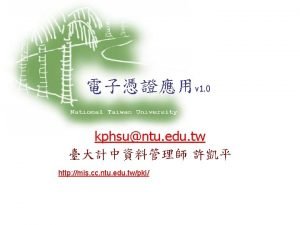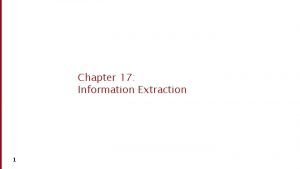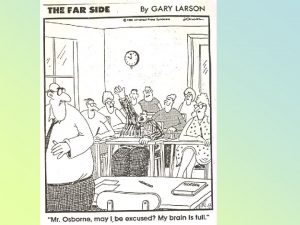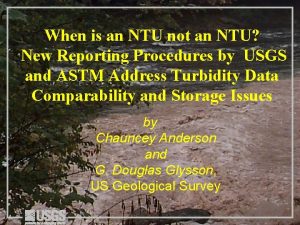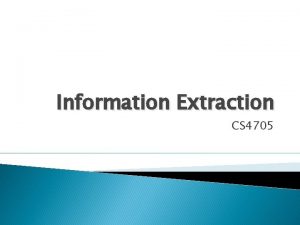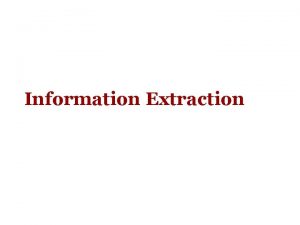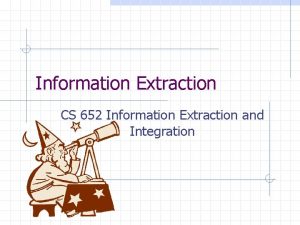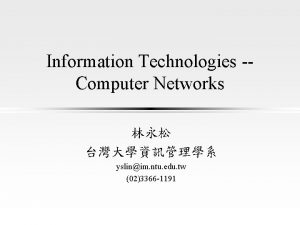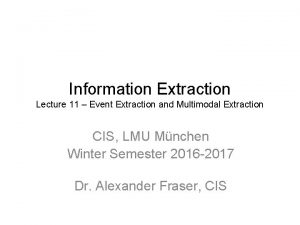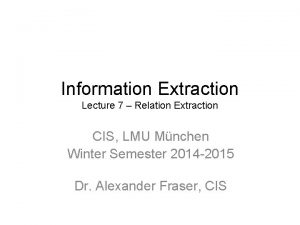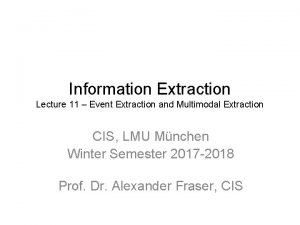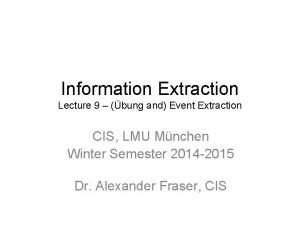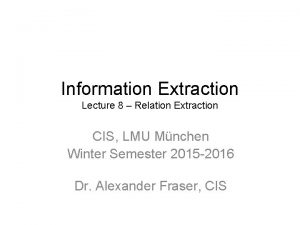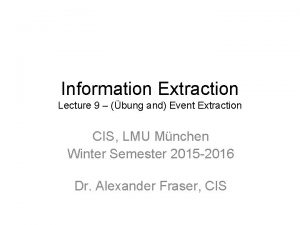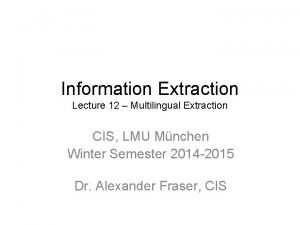Information Extraction Kuanghua Chen khchenccms ntu edu tw





















![Partial Parsing • Fidditch [Hindle, 1983] • Chunker – Rule-based chunker [Abney, 1991] – Partial Parsing • Fidditch [Hindle, 1983] • Chunker – Rule-based chunker [Abney, 1991] –](https://slidetodoc.com/presentation_image/d20df205d46ae16976362d5cfd9c995f/image-22.jpg)






- Slides: 28

Information Extraction Kuang-hua Chen khchen@ccms. ntu. edu. tw Language & Information Processing System Lab. (LIPS) Department of Library and Information Science National Taiwan University

Outline • • • Introduction Information extraction Metadata Text processing techniques Message understanding conference Future researches Language & Information Processing System, LIS, NTU 1998/10/22 2

Information Services • • • Keyword searching Information retrieval (Document retrieval) Information filtering Information extraction Information summarization Information understanding Language & Information Processing System, LIS, NTU 1998/10/22 3

Information Extraction? • A task draws out some information from documents based on predefined templates. • A predefined template is a collection of attribute -value pairs. • The templates play the roles of metadata formats but with different faces. Language & Information Processing System, LIS, NTU 1998/10/22 4

Specificity of an IE Task • Due to the specificity of task, extracting what kind of information is domain-dependent. • For example – MUC-5 : the target documents are news articles about joint ventures and microelectronics – MUC-6 : the target documents of are news articles about management changes Language & Information Processing System, LIS, NTU 1998/10/22 5

Templates • User-defined templates – Dynamically customized based on user’s information need – Researches of information extraction • Authority-controlled templates – Statically specified by some authorities – Researches of metadata research Language & Information Processing System, LIS, NTU 1998/10/22 6

Metadata • Metadata is data about data • Metadata is used to describe other information based on some rules or policies • Examples – Person: ID card, driver’s license – Book: MARC Language & Information Processing System, LIS, NTU 1998/10/22 7

Examples of Metadata • GILS – Government Information Locator Service • FGDC – Federal Geographic Data Committee Standard • CIMI – Consortium for the Computer Interchange of Museum Information Language & Information Processing System, LIS, NTU 1998/10/22 8

Functions of Metadata • • • Location Discovery Documentation Evaluation Selection Language & Information Processing System, LIS, NTU 1998/10/22 9

What Information? • • • Person Event Time Place Object Relationship Language & Information Processing System, LIS, NTU 1998/10/22 10

MARC • In order to make the readers or users convenient to find the books in libraries, each book has been cataloged in Machine-Readable Cataloging (MARC) format based on Anglo-American Cataloging Rules, 2 nd edition (AACR 2). • Take the book “The Electronic Libraries” by Kenneth E. Dowlin as an example. Language & Information Processing System, LIS, NTU 1998/10/22 11

001 005 008 010 020 040 050 00 082 00 091 095 . . . 83021957 //r 91 19911024125216. 4 831004 s 1984 nyua b 00110 eng cam a 83021957 //r 91 0918212758 (pbk. ) : |c$24. 95 DLC|c. DLC|d. DLC Z 678. 9|b. D 68 1984 025/. 04|219 Z/678. 9/D 68/1984///1410222 AL/1415924 CL/1453410 CL/1733896 CF TUL|b. AL|b. CL|b. CF TUL|d. Z 678. 9|e. D 68|y 1984|t 095|b. AL|c 1410222 . . . 099 TUL|d|e|y|f|t 091|b|c|x|z 100 10 Dowlin, Kenneth E 245 14 The electronic library : |bthe promise and the process / |c. Kenneth E. Dowlin 260 0 New York, N. Y. : |b. Neal-Schuman Publishers, |cc 1984 300 xi, 199 p. : |bill. ; |c 23 cm 440 0 Applications in information management and technology series 504 Includes bibliographical references and index 650 0 Libraries|x. Automation 650 0 Information technology 910 8'93 D#139 MCL Language & Information Processing System, LIS, NTU 1998/10/22 12

Dublin Core • A simple metadata format • For the networked information • Contain 15 elements Language & Information Processing System, LIS, NTU 1998/10/22 13

Elements of Dublin Core Language & Information Processing System, LIS, NTU 1998/10/22 14

Automaticity • It is needed to develop some automatic or semiautomatic procedures to “catalog” these existed homepages or other untagged documents without large human efforts. • Researches of information extraction cast light on the resolution to these problems. Language & Information Processing System, LIS, NTU 1998/10/22 15

Complexity and Automaticity of Metadata Format complexity automaticity Language & Information Processing System, LIS, NTU 1998/10/22 16

Components of IE Systems • • • Tokenization module Stemming module Word segmentation module Lexical analysis module Syntactic analysis module Domain knowledge module Language & Information Processing System, LIS, NTU 1998/10/22 17

Techniques for Text Processing • Researches of natural language processing (NLP) have developed many high-performance analysis systems. • The performance of tokenization module is about 98% correct rate [Palmer and Hearst, 1994]. – The difficulty of this part is to distinguish whether periods are full-stop or part of abbreviations. Language & Information Processing System, LIS, NTU 1998/10/22 18

Techniques for Text Processing (continued) • The Stemming module is also good enough. – Porter algorithm [Porter, 1980] – Two-level morphology [Koskenniemi, 1983]. • Lexical analysis module, the most improved part of researches of NLP in recent years. – Probabilistic tagger [Church, 1988] – Rule-based tagger [Brill, 1992] – Hybrid tagger [Voutilainen, 1993] – Finite-state tagger [Kempe, 1997] Language & Information Processing System, LIS, NTU 1998/10/22 19

Word Segmentation • Chinese word segmentation –將黃大目的確實行動作了解釋 (改寫自張俊盛教授舉的例子) –將 黃大目 的 確實 行動 作 了 解釋 • Segmentation approach – CKIP, SINICA – BDC – NLP, NTHU – NLPL, NTU • Take proper nouns into consideration Language & Information Processing System, LIS, NTU 1998/10/22 20

Syntactic Analysis • The most challenging work • From the viewpoint of NLP, the correct and complete parse tree is very important • For applications like IR and IE, time is the most critical factor • Leverage time and correctness factors is important • Partial parsing Language & Information Processing System, LIS, NTU 1998/10/22 21
![Partial Parsing Fidditch Hindle 1983 Chunker Rulebased chunker Abney 1991 Partial Parsing • Fidditch [Hindle, 1983] • Chunker – Rule-based chunker [Abney, 1991] –](https://slidetodoc.com/presentation_image/d20df205d46ae16976362d5cfd9c995f/image-22.jpg)
Partial Parsing • Fidditch [Hindle, 1983] • Chunker – Rule-based chunker [Abney, 1991] – Probabilistic chunker [Chen and Chen, 1993] • Transformational-based parser [Brill, 1993] • Probabilistic binary parser [Chen, 1998] • Finite-state parser Language & Information Processing System, LIS, NTU 1998/10/22 22

Message Understanding Conference • A gathering of researchers in natural language processing • Conference participants must develop NLP systems that perform a variety of information extraction tasks • Each system's performance is evaluated by comparing its output with the output of human linguists Language & Information Processing System, LIS, NTU 1998/10/22 23

MUC Tasks • MUC-1 (1987) and MUC-2 (1989) – naval operations • MUC-3 (1991) and MUC-4 (1992) – terrorist activity • MUC-5 (1993) – joint ventures and microelectronics • MUC-6 (1995) – management changes Language & Information Processing System, LIS, NTU 1998/10/22 24

MUC-6 Tasks • Named Entity (NE) requires only that the system under evaluation identify each bit of pertinent information in isolation from all others. – person names – company names – organization names – location – dates, times, currency • Coreference (CO) requires connecting all references to "identical" entities. • Template Element (TE) requires grouping entity attributes together into entity "objects. " Language & Information Processing System, LIS, NTU 1998/10/22 25

Results of MUC-6 Language & Information Processing System, LIS, NTU 1998/10/22 26

MUC-7 Tasks (1998) • • Name Entity (NE) Coreference (CO) Template Element (TE) Template Relationship (TR) requires identifying relationships between template elements. • Scenario Template (ST) requires identifying instances of a task-specific event and identifying event attributes, including entities that fill some role in the event; the overall information content is captured via interlinked "objects. " Language & Information Processing System, LIS, NTU 1998/10/22 27

Future Researches • Dynamic templates gradually shift to static metadata through user study • High-performance, fast parsing algorithm • Discourse analysis • Summarization as information extraction • Multimedia, intermedia consideration • Multimodal, intermodal consideration Language & Information Processing System, LIS, NTU 1998/10/22 28
 Chen chen berlin
Chen chen berlin Ntu.edu.ua:9095
Ntu.edu.ua:9095 Csie ntu
Csie ntu Temporal information extraction
Temporal information extraction Ner relation extraction
Ner relation extraction Information extraction algorithms
Information extraction algorithms Edu.sharif.edu
Edu.sharif.edu Ntu vpn
Ntu vpn Ntu scambiatore
Ntu scambiatore Ntu method
Ntu method Stripping factor formula
Stripping factor formula Ntu student dashboard
Ntu student dashboard Ntu heat transfer
Ntu heat transfer Ntu in networking
Ntu in networking Ntu method for heat exchanger
Ntu method for heat exchanger Google map
Google map Ntu grade descriptors
Ntu grade descriptors Aço ntu-qc-250
Aço ntu-qc-250 Ntu 軟體
Ntu 軟體 Ntu col
Ntu col Ntu-rgbd
Ntu-rgbd Ntu lis
Ntu lis Cisco ntu
Cisco ntu Eportfolio ntu
Eportfolio ntu Sslvpn ntu
Sslvpn ntu Ntu ie
Ntu ie Sha 3
Sha 3 Dion goh ntu
Dion goh ntu Ntu giee
Ntu giee
